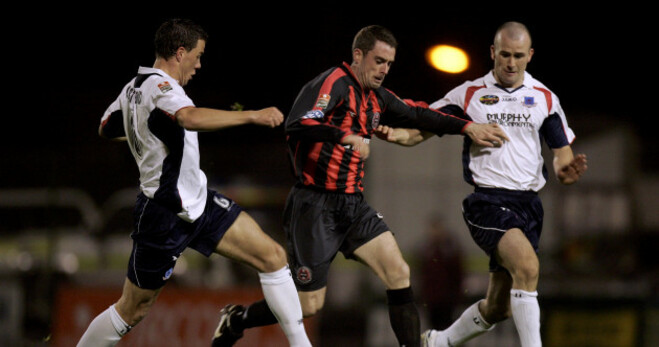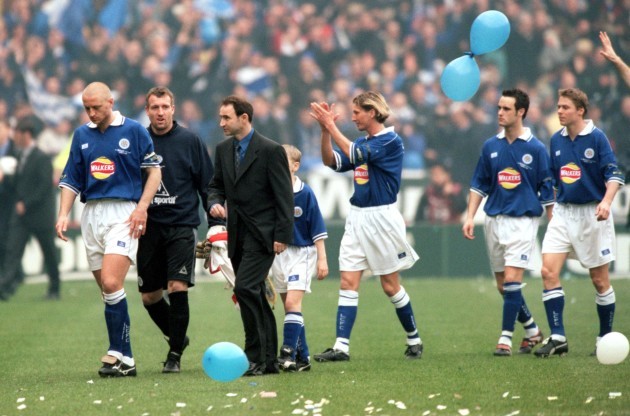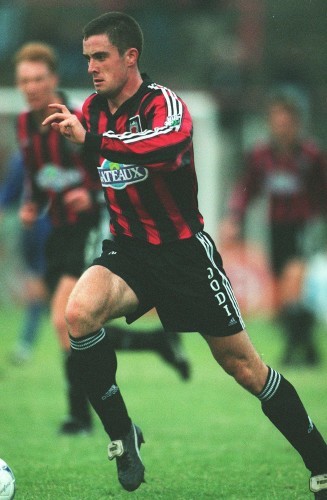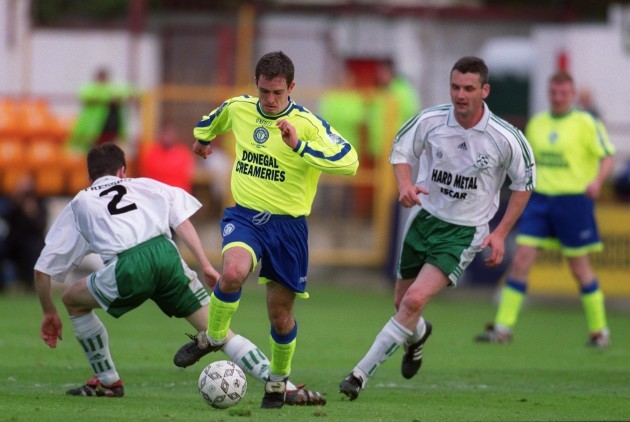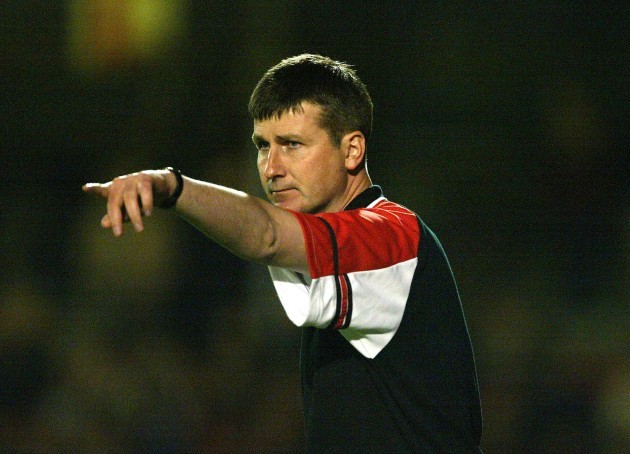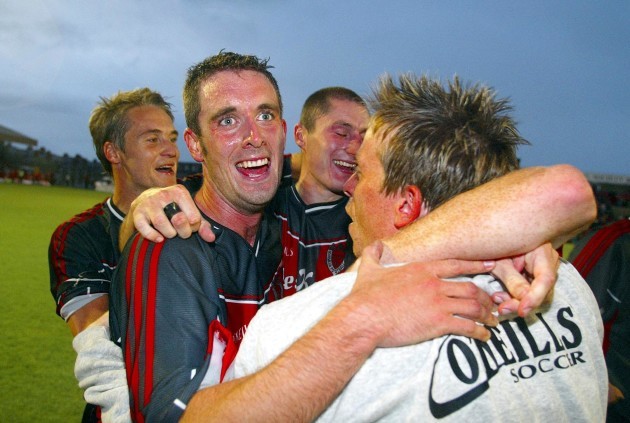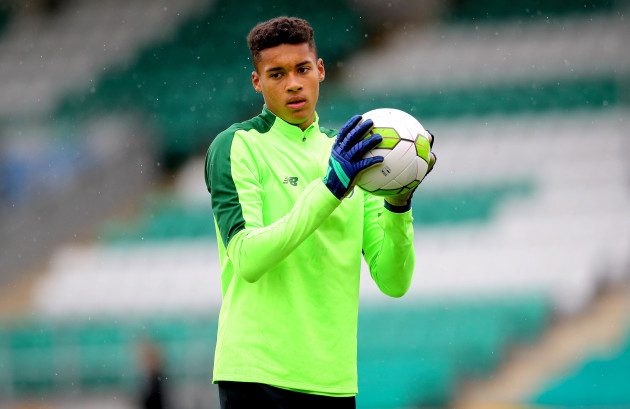NOWADAYS, FERGAL HARKIN is working behind the scenes at Manchester City, helping the next generation of youngsters on their way.
The Donegal man should have plenty of advice to pass on, having taken an unusual route to Martin O’Neill’s Leicester City before experiencing the highs and lows of League of Ireland football with Finn Harps and Stephen Kenny’s Bohemians.
1. Love of the game
For Harkin, it all began in picturesque Ballyliffin on the Inishowen peninsula. Growing up almost as far north as you can go in Ireland — long before greats of the golfing world descended on his home in 2018 — football was a good way to pass the time.
“To be honest, there wasn’t much else to do,” Harkin tells The42. “I was brought up in a lovely little village but it was a little village, and there was few people in it. And all the kids, any spare time we had, we just played football in someone’s garden. That was all we did.
“We had a golf course as well, which obviously was in the news a lot last year because they had the Irish Open, which was brilliant. But when you see the size of our village, it’s amazing that we had such a competition.
“All we did growing up was outside playing sport, whether it was Gaelic, soccer, golf, athletics… I just was outside the whole time. So I fell in love with the game. You’re watching all the English teams on TV and you want to be a professional but to try and get there is very, very difficult. But you just play it because you love it — and that’s all I did.”
Given the circumstances, the odds on a kid from Ballyliffin making it to a Premier League team must have seemed as remote as Harkin’s home may have felt during some dark winter months that Donegal can be prone to. He played for local side Clonmany Shamrocks, togging out with the men’s team from the age of 15 because – apart from a summer league – there was no underage football.
You look at what kids have now and it’s unbelievable but we didn’t get any games,” he says. “Aside from schools football, [you'd be] lucky to get 10 games a season.” Inclement weather was a factor, but that wasn’t the only reason for a lack of competitive action during winter. “It’s facilities as well. You think back — were there any artificial pitches? No. So everything was on grass and it was so wet, [games] were called off.
“There were no floodlights for evening training. I remember one of the indoor halls that we used to go to, it was actually sand inside because they didn’t have money in the early days to put a proper floor down. That’s what we played on… we probably had that for about two years.”
2. A model student
Harkin came from a generation where the odd player could still get picked up after finishing their Leaving Cert, but it was surely rare to get a chance in the English game after completing a third-level education. His break, though, came after he travelled to Loughborough University in Leicestershire.
“I think that was when it sort of took off for me, when I went to university. Because I was always quite small and I went and studied sports science at uni, and actually developed physically. Got a lot stronger, got a lot quicker. And I was always pretty skilful, so that’s sort of when my football took off, in those three years.”
Harkin would end up spending 18 months with Leicester City, who in the late 1990s were becoming a solid Premier League team. He may have been a latecomer to the professional world — with his lack of game time as a youngster playing against him — but he had never set a time limit.
Study came first but I was never in the mindset that ‘right, I’ll work on it until I’m 17 — if I’m not playing professional I’ll give up,’” he says now.
“I played because I just loved playing. It was always any spare moment, kicking a ball and trying to arrange five-a-sides and different things with friends. So I never gave up but I suppose at that time I thought I’m going to end up being a teacher or going to end up doing something in sport — maybe sports science research.
“And then in my final year at uni, I was recommended to Leicester and I went in and played some games for the reserves. They asked me to come on pre-season and offered me a contract at the end of it. So I got a year’s deal. I had my degree — I would have just completed it that summer — and then I went straight into being a professional. So that was a bit surreal, going from being a student to going into a dressing room with these Premier League players.
3. The O’Neill influence
Harkin had been spotted by Leicester while lining out for Loughborough University’s team, who often played reserve sides from top clubs in friendly matches. His side featured several former academy players who had gone back to education, but the youngster from Donegal still stood out.
Shortly after his arrival at Leicester, he immediately switched positions at the behest of first-team manager Martin O’Neill. “I never played centre mid until I went for my very first game at Leicester,” Harkin explains. “Martin O’Neill told me to go in the middle in the first match, and I stayed there ever since because I loved it. I’d never played central midfield before — I always played on the wing.”
Did the future Republic of Ireland manager explain his reasoning?
“Probably because there were better wingers than me and that was the only space on the team,” he laughs. “But I loved it because I could always run. My fitness was always good so being able to get up and down was an advantage.
“The manager used to watch most of our games and he was well aware of how we were doing. If there was any little pieces of advice to give, he would certainly give it.
The manager created an unbelievable team spirit amongst the guys as well. They all knew what they needed to do when they went out at the weekend, and it was a brilliant period for the club.”
Harkin may have been playing for Leicester’s reserve team but he regularly rubbed shoulders with some of the stars in O’Neill’s side during both training and matches.
“Back in those days when we played reserve matches, a lot of the first-team players played as well. So it wasn’t like nowadays where it’s only kids. If you weren’t in the 11 at the weekend, you played for the reserves. So it was brilliant playing with and against some really good players. I felt in that period, I came on a lot and my game developed.”
4. Learning at Leicester alongside Guppy and Lennon
Before the team that miraculously won the Premier League in 2015/16, the Leicester squad that Harkin mixed with was one of the most successful in the club’s history. Promoted as Championship Play-off winners in 1996, they won the League Cup after a replay against a star-studded Middlesbrough side a year later.
The Foxes had two top-10 finishes during Harkin’s time at Filbert Street, before winning the League Cup again in 2000.
“The team was excellent at the time,” Harkin recalls. “You had players that were playing in the [1998] World Cup, the likes of Matty Elliott who went to the World Cup with Scotland. Neil Lennon was playing, Muzzy Izzet, [Emile] Heskey. Kasey Keller, the goalkeeper that went to the World Cup with America. Steve Guppy.
There was quality right throughout the team. It was the year that Leicester won the League Cup and we played Atletico Madrid in the Uefa Cup. So it was a brilliant period, and I learned loads.”
Harkin found himself picking up tips from every source – but most of all from a hard-working wide man who would go on to play under O’Neill at Celtic and work on his coaching staff with the Republic of Ireland.
“I tried to learn from everyone,” Harkin says. “I think you learn from what to do and what not to do. Look, if I had to pick one player out, it would probably be Steve Guppy. He came into the game late but his commitment and his dedication and his will to try and be better was unbelievable. He used to stay back most afternoons, do extra training — and he was a first-team player. I learned loads from him.”
A first-team breakthrough never came for the Donegal man, and he left in the summer of 1998.
“To be honest, I wasn’t good enough,” Harkin says now. “I’d gone on trial to a couple of clubs. One of them I’d actually agreed a contract with. I agreed a contract to go to Port Vale. They were in the Championship at the time. So I’ve gone up there and the agreement was to start for the first week of pre-season.
“I came home for the summer and two nights before I was due to fly back, they rang and basically said they had no money and they couldn’t honour the contract. So that was disappointing to say the least.
“I’d been on trial at two or three clubs. The mental strain of going on trial again — I just didn’t really fancy it.
“And then about 24 hours later I got a call from Eamonn Collins, who had gone into Bohemians as assistant coach. He invited me up, said they were very interested in signing me.
“So I decided to go up. I said if they offer me something I’ll sign, and if I’m good enough to go back to England then someone will come in for me. And if not, I’ll just stay in Ireland and enjoy myself and try and make the best of it.
“And that really is how it happened. I went up to Bohs, did a training session, loved it. The training, loved what I felt the club was going to be. And signed pretty much straightaway.”
5. Briefly at Bohs, happy at Harps
An obvious attraction, for a creative midfielder comfortable on either foot, was that Bohs had ambitious plans to thrive as a full-time outfit.
“Yeah, exactly, to be able to train everyday was something that I wanted to continue to do,” Harkin says.
They were a big club and they had aspirations to get back and start challenging again for the league. I was only there for one training session when I got offered a contract but I loved it. Eamonn Collins was a fantastic coach and it was all about playing football. And I just thought ‘why not?’.
“I think, as well, the fact that I had my degree behind me, I wasn’t really chasing the football. Because when I got offered the deal at Port Vale, I went on trial there and I played better than I’d ever played. And you think ‘if I’m still not getting a contract or they can’t honour it, based on how I played, then maybe I’m just not good enough’. So I was quite realistic about it as well.”
Joe McGrath was in charge of Bohs at the time, having just come back from managing New Zealand, but a change of head coach soon saw Harkin on the move again.
“I think it was 11 games I played and then Roddy [Collins] came in. In fairness to Roddy, he’s got his own ideas and he basically said ‘you’re not my type of player and you’re not going to play.’ And I admire his honesty because at least he didn’t have me sitting around.”
Harkin didn’t want to leave Bohs, but he wanted to play as well. Within 24 hours of Finn Harps expressing an interest, he was on his way back to Donegal. He didn’t feel any extra pressure, however, because he was still something of an unknown quantity in his home county.
“I probably wasn’t that well known in Donegal, because I hadn’t played many matches when I was a kid. I didn’t always get in all the county sides. So it wasn’t that I’m coming back and I’m going to be a big name. I think I probably had a lot to prove and was nervous in terms of doing that. But it was up to me. I had belief in my ability. I knew I could play and it’s just to go and do it.
“Harps were doing quite well at the time too, so it was nice to go back. There was a good buzz around the club. Charlie McGeever had put a good squad together. It was nice to be part of that but I always knew it was going to be toughas well because the midfield at the time, there were good players about and I had to break into that. So it was going to be challenging.”
It took a couple of weeks to get to grips with the challenge, since Harkin didn’t get off to the best of starts.
“I remember, I think it was my second game for Harps, and we played UCD in Belfield. And it was probably the worst game I’ve ever played… I thought after that ‘it can only get better.’
I actually remember getting hammered in the local press for how bad I was — and rightly so. From then, I think we played in an FAI Cup game shortly afterwards and I scored a goal. That’s when things started to go really well. I built up a good relationship with Donal O’Brien in the middle of the park.”
With Declan Boyle and Gavin Dykes offering security at the back, the robust O’Brien and cultured Harkin provided a platform for the like of James Mulligan, Jonathan Speak and a young Kevin McHugh to get goals.
Harps enjoyed a memorable season as a result, finishing fourth in the league – narrowly missing out on a European place – and reaching the FAI Cup final.
“Yeah, it was brilliant,” Harkin says. “The crowds that used to come in to Finn Park, the atmosphere around the club. It was just really, really enjoyable. We were a very attack-minded team. We had players that could score goals, there was a great team spirit… it was just a great time to be part of the club.”
6. Harps vs Bray: the never-ending cup final
One major setback, however, was Harps’ defeat against Bray Wanderers in the 1998/99 cup final – which was finally settled after two replays. Bray had been relegated shortly before the decider, although Pat Devlin’s side could have won adour first match.
Two days later the pair were at it again, but this time Harps were much improved. In the 87th minute Barry O’Connor cancelled out Speak’s opener for Harps, but the Donegal side continued to dominate and looked on course for victory when Tom Mohan put them ahead in extra-time.
Bray were awarded a penalty right at the death, however, and though Brian McKenna saved Colm Tresson’s effort, Ciaran O’Brien pounced on the rebound to make it 2-2 in the 122nd minute.
“That’s where we lost it,” says Harkin, who was 22 at the time and won the man of the match award for his performance in the second meeting at Tolka Park.
“We lost it in that second game, not in the third game. We were dead after that second one. We had come so close and we just didn’t recover. We should have had the game dead and buried. Then they got the late penalty. Even missed the penalty, scored the rebound. It was just energy sapping.”
Speak put Harps ahead in the third match, but Bray hit back to win thanks to a Jason Byrne double. The experience of playing three times in six days was a particularly painful way to miss out on what would have been Harps’ first trophy since 1974.
“Yeah, it was really strange,” Harkin sighs. “And funny, I’ve never watched the games back. I’ve often been tempted but I never have. Just the sense of disappointment – what could have been if we had have won that.”
Harps have slipped between the top flight and the second tier on several occasions since, but at that stage they were an established Premier Division side. Just how far could that squad have gone had the club managed to claim the FAI Cup for only the second time in their history?
“Who knows?” Harkin replies. “There would have been European football. I think the whole county would have invested more in the team. People would have been attracted to the potential of moving into a new stadium. They might have had the finances for that — who knows? Certainly in the time that I was still playing, the club never got over the disappointment of that cup final.”
7. The Dublin-Donegal road
The wheels weren’t long in coming off for Harps following that near miss in 1999. Two years later, they were unable to avoid the drop. “Getting relegated with Harps was the low point in my career,” Harkin admits. “It was devastating. And I was captain, which made it even worse. But even though I was playing with Harps, I was living in Dublin and I wasn’t training with the team. I was literally coming for games.
I did that for two-and-a-half years and I found it really tough. I wanted to be in a team where I was training with the team every day, or two or three days a week. I didn’t want to just be turning up for games. I felt awkward being captain of a club and only turning up for matches.”
Training in or around Dublin was hardly ideal, though the team that had beaten Harps in the cup were of great help. “A lot of it with Bray Wanderers, actually,” Harkin says, when asked where he trained when based in Dublin.
“Pat Devlin was brilliant. He let me come out and train with the guys. I used to go out there on a Tuesday night and a Thursday night. It’s different — you want to be with your team-mates. But the lads at Bray were fantastic, and they let me do that.”
Nowadays Finn Park can be reached from Dublin in about three hours, but back then the roads were a lot worse, and it was a taxing journey. “We had one of the Harps supporters who lived in Kildare, and he used to come up to all the games,” Harkin explains.
“He used to drive myself mainly, Dom Tierney, Brian McKenna in the early days. He used to pick us up and drive us up to the game. We always stopped off for a pre-match meal in Castleblayney I think it was and then continue the journey. We used to just sleep in the car and then on the way back generally the same. Peter Furlong, the guy that drove us, was fantastic. He was our taxi for two-and-a-half years and he was brilliant.
“But it was tough. You didn’t get home most Saturdays until half one, two o’clock in the morning. Sometimes treacherous conditions, with wind, rain, frost. It was a great time but it was tough and it wasn’t conducive to maximising potential, bynot being able to train with your team every day.”
8. The Kenny effect
Following relegation, Harkin didn’t have to think twice about returning to Bohs, and when things didn’t work out for Pete Mahon, a young manager called Stephen Kenny – who had led Longford to promotion, the FAI Cup final and the Uefa Cup – stepped in.
“Stephen came in and he’d done brilliantly with Longford so he had respect straightaway,” Harkin says. “He had a great work ethic. He was really committed and I think his strength was picking up players that really had a point to prove.
“Training was interesting and enjoyable. We used to play a lot of football — he encouraged us to play the whole time. And he put a good bunch of players together. The team spirit with our team was excellent — really, really good.
“The summer I signed, the team had won the league the year before. Won the double, actually. So the expectation was to go again, absolutely. And our team was good enough to do that.
“So we knew when Pete was there we’d underperformed. Pete didn’t last too long. Stephen came in and then we got to a cup final at the end of that year as well. Next year was like ‘we’ve got to try and win the league.’ And we did.”
Harkin operated mostly on the wing under Kenny, but he says it was such a great team that you didn’t mind where you played. And he wasn’t too surprised to see the current Republic of Ireland U21 manager have the career he’s had.
No, not really. Even from a young age he was so driven and very, very clear in what he wants. He’s got an unbelievable work ethic. I think he’s great at spotting a player.
“And the experience that he’s gained over the years… you don’t continuously be successful if you’re not able to change and adapt. And I think Stephen is. He’s done an unbelievable job at Dundalk. To keep them motivated year after year after year is not easy.”
9. Ecstasy and agony
Harkin and Kenny bounced back quickly from cup final defeat against Dundalk to win the Premier Division in the 2002/03 season. Glen Crowe finished as the league’s top goalscorer, but it was Bobby Ryan who got a late winner to see off title rivals Shelbourne with three games to go.
“The football we played that year was so good,” Harkin says. “There was big crowds came to Dalymount, there was a brilliant buzz… It was just a great time to be part of the club. And then when we won the league at Tolka Park, it was amazing.”
In the Champions League qualifiers that followed during the first year of summer football, Harkin got to experience an impressive win over BATE Borisov that led to a more humbling experience against Rosenborg.
They were heady times in Phibsborough, and there were appreciative crowds at Dalymount Park.
“The fans at Bohs were amazing, they really were,” Harkin says. “From the first moment that I played a match there, they seemed to accept me and adopt me a little bit.
“But all they want is for you to work hard — to work hard for the club. I wasn’t the best tackler in the world but I’d run around and be a nuisance,and try to do things when I got the ball. They liked that little bit of flair but you had to work hard as well. I couldn’t say enough positive about the place. They were brilliant to me, and still are any time I go back.”
While Bohs were a full-time club for most of his time there, Harkin was combining playing with his day job at Nike. He said he usually ended up missing only one training session a week, and Bohs had three more top-three finishes during his stay.
The quick-witted midfielder was still creating and scoring goals – picking up a couple of club Player of the Year awards as a result – but, shortly before his 31st birthday, he was forced to call a halt after the 2007 season.
I think it was in my second and third to last seasons I was Player of the Year. I thought I was doing well but the problem was at the end of each of those seasons, towards the end, I ended up having to have a cartilage operation on my knee.
“I could go for about nine months and then I’d have to have another operation. So I ended up with three in a row and I couldn’t train every day. When I don’t train every day I’m okay but if I’ve been pounding on my knees every day, I really struggle — struggle to get out of bed. That was when I sort of knew that it was coming towards an end.”
10. The future: for Donegal and Ireland
Twenty years after that devastating FAI Cup final defeat, Finn Harps are playing Premier Division football again. Plans for a new stadium are up and running once more, and the club has enjoyed significant success at underage level.
Harkin feels that there is lots of potential in his home county.
“People in Donegal just love playing sport. The Gaelic team are generally quite good and there or thereabouts. It’s a big county so travelling throughout it can be an issue in the winter. So the key to creating the players is to have the facilities. That they can train 365 days a year, and also have a competitive league or competitive fixtures that kids can play.
“If they do that, there is a conveyor belt of talent for sure. I know Finn Harps U17s and U19s have done well in the national league. So those players should be then given a pathway into the first team.”
At Manchester City, Harkin hears a few Irish accents around the club, with former Shamrock Rovers goalkeeper Gavin Bazunu one of the latest teens to join him there. Now into his 40s, he plays a key role in managing young players who get a loan move from the English champions, helping them to graduate from academy to senior football.
So having seen how academies worked as a player and the way the game has developed since, what advice would he give to Irish youngsters who dream of making it in England?
Harkin accepts that on paper it seems more difficult because Irish prospects are now competing with players from all over the world, rather than within a relatively small region.
But he also believes that if Irish players have the right approach – and opportunities – they can still rise to the top.
“For one, I don’t think you ever give up. You play the game not because you want to be a professional and earn loads of money. You play the game because you love it. As long as you still have that, then you should never give up.
I think if Irish football is to continue to develop, the facilities and the fixtures for players need to be better. There’s nothing better than playing games and challenging yourself.
“If I look back, that’s probably what I didn’t have. An ability to train everyday on — not the best facilities — but just on adequate facilities. And then an opportunity to go and challenge yourself against the best players, whether it’s in your county or your province. That’s what you need.
“But certainly Irish kids have as much of an opportunity or a chance of playing in the Premier League as English kids. Why not?”
